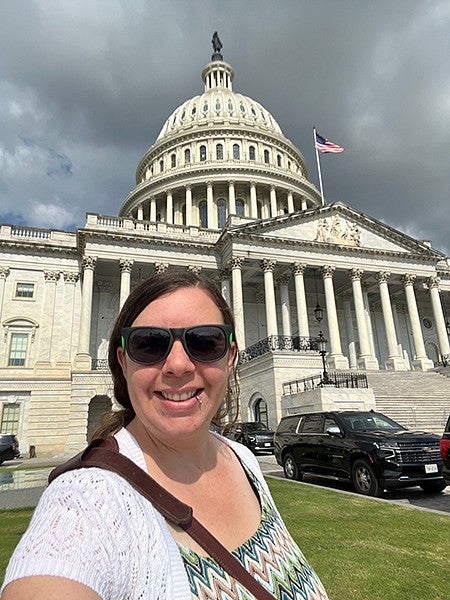
Relationships as the Foundation for Systemic Change: COE Alumna Kristin Rush’s Journey from Practice to Policy
“The COE provided a foundation that has supported me at each stage of my career. In the school psychology program, I learned how to combine data-driven practice with care for the human experience.” – Kristin Rush
Kristin Rush’s career is a testament to the power of relationships and systems thinking in shaping meaningful change in education. A 2014 graduate of the University of Oregon College of Education’s School Psychology program and a current doctoral candidate in Educational Leadership (anticipated 2026), Rush now serves as an Operations and Policy Analyst for Oregon’s Teacher Standards and Practices Commission (TSPC). Her work bridges the gap between educator preparation and policy, with a focus on social and emotional learning (SEL), cultural responsiveness, and educator well-being.
Rush reflects on her experience with the College of Education’s (COE) school psychology program. “My educational training as a school psychologist grounded me in developmental science, trauma-informed care, and systems thinking, tools that continue to guide my work every day,” she explained. These tools became essential as she transitioned into policy work, where she now supports faculty across Oregon in preparing future educators.
Returning to UO for her EdD allowed Rush to expand her perspective. “It’s helping me to zoom out to the policy level, learning how to lead systemic change that still centers the well-being of individual students and educators,” she said. This dual lens that’s grounded in both practice and policy, enables her to navigate the complex intersections of education systems.
Rush’s impact is felt most in her current role at TSPC when faculty begin to integrate SEL into their teaching. “When faculty tell me that the tools or resources that I am helping to create changes how they approach their teaching, I feel affirmed in this work,” she shared. “It shows me that what I am doing has a lasting impact on both educators and the students they serve.”
Reflecting on her time as a student, Rush states that peers were her most important support system. “They understood the challenges of graduate school and were always ready to talk through ideas, share resources, or simply provide encouragement,” she recalled. “Having that made it possible to balance academic work with the rest of my life.” The collaboration table on the third floor of HEDCO became a hub of connection for Rush, where collaboration and connection flourished. “People from my cohort were in and out all day, and it became a natural hub for studying, sharing ideas, or just catching up. Some of our best conversations happened there, both about coursework and about life. That mix of connection and support made the program feel like a community rather than just classes.”
Rush’s experience as a student representative for the National Association of School Psychologists (NASP) also shaped her trajectory. “That experience showed me how the skills I was building at the University of Oregon could extend into national-level advocacy,” she said. It was a pivotal moment that connected her academic training to public policy and laid the groundwork for her current role. Mentorship also played a key role in her development. Professors in the School Psychology program left a lasting impression. “They modeled how to integrate behaviorist approaches with humanistic perspectives,” Rush said. “That balance is where social and emotional learning fits for me.” It was also demonstrated that research could be both rigorous and relational, a principle that continues to guide Rush’s work.
Her approach to learning was shaped by what she calls “meta-learning”, the ability to connect ideas to broader systems. “It was not only about completing assignments but about asking how the ideas connected to broader systems,” she explained. This systems-level thinking has informed every stage of her career, from working directly with students and families to shaping policy and studying leadership.
Rush’s offers advice to students just starting college, “Relationships will matter the most,” she said. “The connections you build with peers, mentors, and faculty will shape your path more than any single grade or paper.”
Looking ahead, Rush is focused on completing her doctoral degree and publishing research that supports the integration of SEL into educator preparation. “I want to continue connecting policy and practice in ways that support both educators and students,” she said. Her goal is to build sustainable systems that allow educators to thrive while meeting the demands of modern classrooms. On a personal level, Rush is striving for balance, being fully present in both her professional and family life. Her story is a powerful reminder that real change begins with relationships, and that the most impactful systems are those built on care, connection, and shared purpose.
